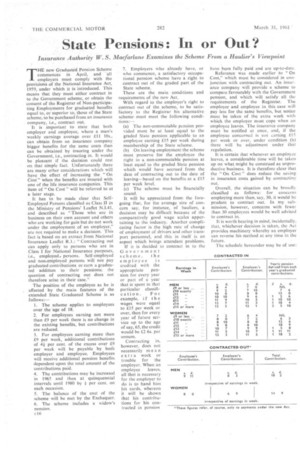State Pensions: In or Out?
Page 44

If you've noticed an error in this article please click here to report it so we can fix it.
Insurance Authority W. S. Macfarlane Examines the Scheme From a Haulier's Viewpoint
THE new Graduated Pension Scheme commences in April, and all employers must comply with the provisions of the National Insurance Act, 1959, under which it is introduced. This means that they must either contract in to the Government scheme, or obtain the consent of the Registrar of Non-participating Employments for graduated benefits equal to, or superior to, those of the State scheme; to be purchased from an insurance company, i.e., contract out.
It is important to state that both employer and employee, where a man's weekly earnings average over Ell 10s., can obtain from an insurance company. bigger benefits for the same costs than can be obtained by insuring under the Government, i.e., contracting in. It would be pleasant if the decision could rest on that simple fact. Unfortunately there are many other considerations which will have the effect of increasing the "On Cost" when the benefits are insured with one of the life insurance companies. This item of "On Cost" will be referred to at a later stage.
, It has to be made clear that SelfEmployed Persons classified as Class II in the Ministry of Pensions' Leaflet N.I.41, and described as "Those who are in business on their own account and others who are working for gain but do not work under the employment of an employer," are not required to make a decision. This fact is based on an extract from National Insurance Leaflet RI: 'Contracting out can apply only to persons who are in Class I for National Insurance purposes, i.e., employed, persons. Self-employed and non-employed persons will not pay graduated contributions or earn a graduated addition to their pensions; the question of contracting out does not therefore arise in their case."
The position of the employee as he is affected by the main features of the extended State Graduated Scheme is as follows:— I. The scheme applies to employees over the age of 18.
2. For employees earning not more than £9 per week there is no change in the existing benefits, but contributions are reduced.
3. For employees earning more than £9 per week, additional contributions of 4.1per cent. of the excess over 19 per week will be payable by both employer and employee. Employees will receive additional pension benefits dependent upon the total amount of the contributions paid.
4. The contributions may be increased in 1965 and then at quinquennial intervals until 1980 by 4per cent. on each occasion.
5. The balance of the cost of the scheme will be met by the Exchequer.
6. The scheme includes a widow's pension. c16 7. Employers who already have, or who commence, a satisfactory occupational pension scheme have a right to contract out of the graded part of the State scheme.
These are the main conditions and requirements of the new Act.
With regard to the employer's right to contract out of the scheme, to be satisfactory to the Registrar his alternative scheme \ must meet the following conditions:—
(a) The non-commutable pension provided must be at least equal to the graded State pension applicable to an employee earning £15 per week during membership of the State scheme.
(b) On leaving employment the scheme must preserve for the employee the right to a non-commutable pension at least equal to the graded State pension which would have accrued from the date of contracting out to the date of leaving—based on the benefits at a £15 per week level.
(c) The scheme must be financially sound.
It will be appreciated from the foregoing that, for the average size of concern say, for instance, of hauliers, a decision may be difficult because of the comparatively good wage scales appertaining to the industry. Another complieating factor is the high rate of change of employment of drivers and other transport personnel, and this in itself is an aspect which brings attendant problems.
cation. For example, if the wages were equal to £15 per week or over, then for every year of future service up to the age of say, 65, the credit would be £2 6s. per annum.
Contracting in, however, does not necessarily mean extra work or trouble for the employer. When an employee leaves, all that is necessary for the employer to do is to hand him
his cards, whereon WOMEN
tracted in pension have been fully paid and are up-to-date.
Reference was made earlier to "On Cost," which must be considered in conjunction, with contracting out. An insurance company will provide a scheme to compare favourably with the Government pension, and which will satisfy all the requirements of the Registrar. The employer and employee in this case will pay less for the same benefits, but notice must be taken of the extra work with which the employer must cope when an employee leaves. The insurance compary must be notified at once, and, if the employee concerned is not earning £15 per week or over, under condition (b) there will be adjustment under that regulation.
It is certain that whenever an employee leaves, a considerable time will be taken up on what might be construed as unproductive business. It is therefore clear that the "On Cost" does reduce the saving in insurance costs gained by contracting out.
Overall, the situation can be broadly classified as follows: for concerns employing more than, say, 30, it would be prudent to contract out. In my submission, however, concerns with fewer than 30 employees would be well advised to contract in.
It is worth bearing in mind, incidentally, that, whichever decision is taken, the Act provides machinery whereby an employer can reverse his method at any time in the future.
The schedule hereunder may be of use:








































































































